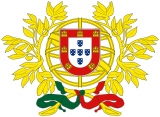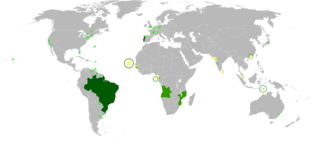| Prime Minister of the Portuguese Republic Primeiro-ministro da República Portuguesa | |
|---|---|
 | |
 | |
| Style | His/Her Excellency |
| Appointer | President of Portugal |
| Term length | Four years maximum. No term limits |
| Inaugural holder | Pedro de Sousa Holstein, Marquis of Palmela |
| Formation | 24 September 1834 |
| Website | portugal.gov.pt |
 |
|---|
| This article is part of a series on the politics and government of Portugal |
| Constitution |
Legislature |
| Foreign relations |
The Prime Minister of the Portuguese Republic (Portuguese : Primeiro-Ministro da República Portuguesa) is the head of the country's Government. He/she coordinates the actions of all ministers, represents the Government as a whole, reports his actions and is accountable to the Assembly of the Republic, and keeps the President of the Republic informed.

Prime Minister is the current title of the head of government of Portugal. As head of government, the Prime Minister coordinates the actions of ministers, represents the Government of Portugal to the other bodies of state, is accountable to Parliament and keeps the President informed. The Prime Minister can hold the role of head of government with the portfolio of one or more ministries.

Portuguese is a Western Romance language originating in the Iberian Peninsula. It is the sole official language of Portugal, Brazil, Cape Verde, Guinea-Bissau, Mozambique, Angola, and São Tomé and Príncipe. It also has co-official language status in East Timor, Equatorial Guinea and Macau in China. As the result of expansion during colonial times, a cultural presence of Portuguese and Portuguese creole speakers are also found in Goa, Daman and Diu in India; in Batticaloa on the east coast of Sri Lanka; in the Indonesian island of Flores; in the Malacca state of Malaysia; and the ABC islands in the Caribbean where Papiamento is spoken, while Cape Verdean Creole is the most widely spoken Portuguese-based Creole. Reintegrationists maintain that Galician is not a separate language, but a dialect of Portuguese. A Portuguese-speaking person or nation is referred to as "Lusophone" (Lusófono).
A government is the system or group of people governing an organized community, often a state.
Contents
- History
- Prime Ministers
- Constitutional Monarchy – Second Liberalism (1834–1910)
- First Republic (1910–1926)
- Second Republic (1926–1974)
- Third Republic (1974–present)
- Timeline
- See also
- Notes
- References
- External links
There is no limit to the number of mandates as Prime Minister. He/she is appointed by the President of the Republic, after the legislative elections and after an audience with every leader of a party represented at the Assembly. It is usual for the leader of the party which receives a plurality of votes in the elections to be named Prime Minister.
A plurality vote or relative majority describes the circumstance when a candidate or proposition polls more votes than any other, but does not receive a majority. For example, if 100 votes were cast, including 45 for Candidate A, 30 for Candidate B and 25 for Candidate C, then Candidate A received a plurality of votes but not a majority. In some votes, the winning candidate or proposition may have only a plurality, depending on the rules of the organization holding the vote.
The official residence of the Prime Minister is a mansion next to São Bento Palace, which, in confusion, is also often called "São Bento Palace", although many Prime Ministers didn't live in the palace during their full mandate.
São Bento Palace in Lisbon is the seat of the Assembly of the Portuguese Republic, the parliament of Portugal. Originally constructed in 1598, São Bento has served as the seat of Portugal's parliament since 1834, when the former monastery of the Benedictine Order was dissolved after the Liberal Wars. During the Portuguese constitutional monarchy, the palace served as the seat of the Cortes Gerais, the traditional parliaments of Portugal, until 1910.















































































































